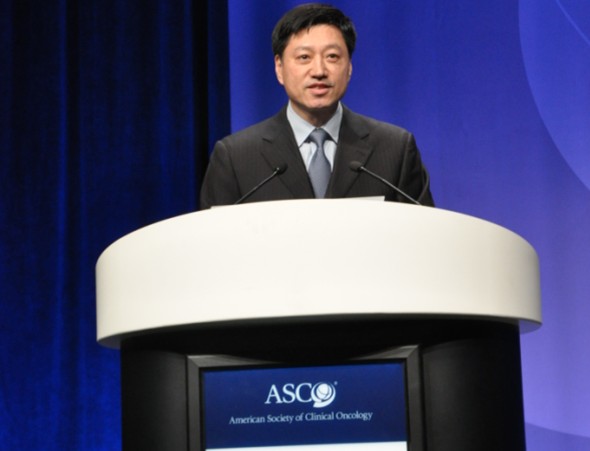芝加哥时间6月2日下午,在2014年美国临床肿瘤学会(ASCO)年会上,复旦大学附属肿瘤医院李进教授在消化道肿瘤(非结直肠癌)专场进行了口头报告:阿帕替尼治疗晚期胃癌的Ⅲ期临床研究。研究结果证实了阿帕替尼治疗晚期胃癌患者的疗效和安全性。

李进教授在ASCO大会上做口头报告
该研究由李进教授和解放军南京八一医院秦叔逵教授共同牵头,是全国38家医院共同参与的大型随机对照临床试验。阿帕替尼是一种口服的小分子VEGFR-2酪氨酸激酶抑制剂,研究报告了阿帕替尼治疗二线化疗失败的晚期胃癌患者的III临床研究结果。
该项多中心、随机、双盲、安慰剂对照的III期试验,共入组273名病人,2:1随机分配至口服阿帕替尼(850mg,po,qd,28天为一个周期)或安慰剂治疗。主要终点是总生存期。
主要研究结果
两组患者在年龄、病史、性别、ECOG评分、转移灶数量、病理分级、临床分期和治疗史上都相似(P>0.05)。
疗效方面,阿帕替尼组相比于对照组,中位总生存期(mOS)明显延长(195天 vs. 140天;HR=0.71;95%CI 0.54-0.94;p<0.016)。阿帕替尼组的中位无进展生存期(mPFS)也明显延长(78天 vs 53天,HR=0.44,95%CI 0.33-0.61;p<0.0001)。阿帕替尼组和安慰剂组的客观缓解率(ORR)分别为2.84%和0.00%。
安全性方面,阿帕替尼组一般耐受性良好。大部分不良反应都可以通过剂量中断或减量来处理。超过2%的病人发生的3/4级不良反应为高血压、手足综合征、蛋白尿、乏力、厌食、转氨酶升高。
本研究进一步证实阿帕替尼治疗晚期胃癌病人的疗效和安全性。李教授在会前接受医脉通的采访时表示,对于所有化疗方案均失败的晚期胃癌病人,这一接近两个月的时间是一个振奋人心的进步。该项研究首次证明抗血管生成的小分子靶向药物在胃癌里的疗效。该项研究获得了大会专家认可,被选为大会口头报告,同时也入选BOA(Best of ASCO)论文,表明中国专家在胃癌领域里为国际肿瘤事业做出的贡献,这主要缘于38家医院研究者的齐心协力,以及病人的奉献。
医脉通整理报道,转载请注明出处。
会议专题》》》2014年ASCO年会专题报道
英文摘要:
Abstract No:4003
Type: Oral Abstract Session (BOA)
Time: Monday June 2, 1:15 PM to 4:15 PM
Abstract:
Background: Molecular targeted therapy has made great progress in the treatment of gastric cancer. This paper reports the outcome of a phase III clinical study of apatinib, as an oral small molecular of VEGFR-2 tyrosine kinase inhibitor, in the treatment of patients with advanced gastric cancer who prior failure to second-line chemotherapy. This study may provide a new treatment options and leading a new hope for these patients.
Methods: This is a multicenter, randomized, double-blind, placebo-controlled phase 3 trial. Apatinib or matching placebo, 850 mg, po, qd, 28 days as one cycle. Primary outcomes were overall survival. Study randomization was centralized and stratified according to the number of metastatic sites (≤2 or >2). Planned to enroll 270 cases: 180 of apatinib and 90 of placebo. This trial was registered with ClinicalTrials.gov, number NCT01512745.
Results: The patient baseline characteristics were similar in two arms in regards to age, historical of the disease, gender, ECOG scores, number of metastatic sites, pathological grading, clinical stage and therapy history(P>0.05). As the efficacy, median overall survival (mOS) was significantly prolonger in the apatinib group compare with in the placebo group (195 days versus 140 days ; HR= 0.71; 95% CI (0.54~0.94); p< 0.016). Median progression-free survival (mPFS) was also prolonged in the apatinib group compared with the placebo group (78 days versus 53 days, HR= 0.44, 95%CI (0.33~0.61), P<0.0001). The objective response rates (ORR) of apatinib group and placebo group were 2.84% and 0.00% respectively. As the safety, Treatment of apatinib group was generally well tolerated. Most of the adverse reaction could be managed by dose interruptions or reductions. Grade 3/4 adverse reactions that occurred in more than 2% of patients were hypertension, hand-and-foot syndrome, proteinuria, fatigue, anorexia, elevated aminotransferase.
Conclusions: This study further confirmed the efficacy and safety of apatinib in the patients with advanced gastric cancer. 850 mg, qd is the recommended dose for clinical use. Clinical trial information: NCT01512745.
